Philosophy Assignment: Short Questions and Answers - College Name
VerifiedAdded on 2023/02/01
|5
|1155
|70
Homework Assignment
AI Summary
This philosophy assignment provides concise answers to short questions covering a range of philosophical concepts and thinkers. Part A addresses topics such as the Copernican revolution, world-historical individuals, social instincts, historical materialism, the sickness unto death, the importance of tolerating eccentrics, the eternal return, the needs of a woman writer, and the symbolism of Sisyphus. Part B focuses on Hegel’s dialectic. Part C delves into Kierkegaard’s concept of despair. Part D explores Mill’s arguments for tolerating eccentricity and individuality, as well as the contributions of original individuals to society and the limits he places on freedom. The assignment offers a comprehensive overview of significant philosophical ideas and their proponents.
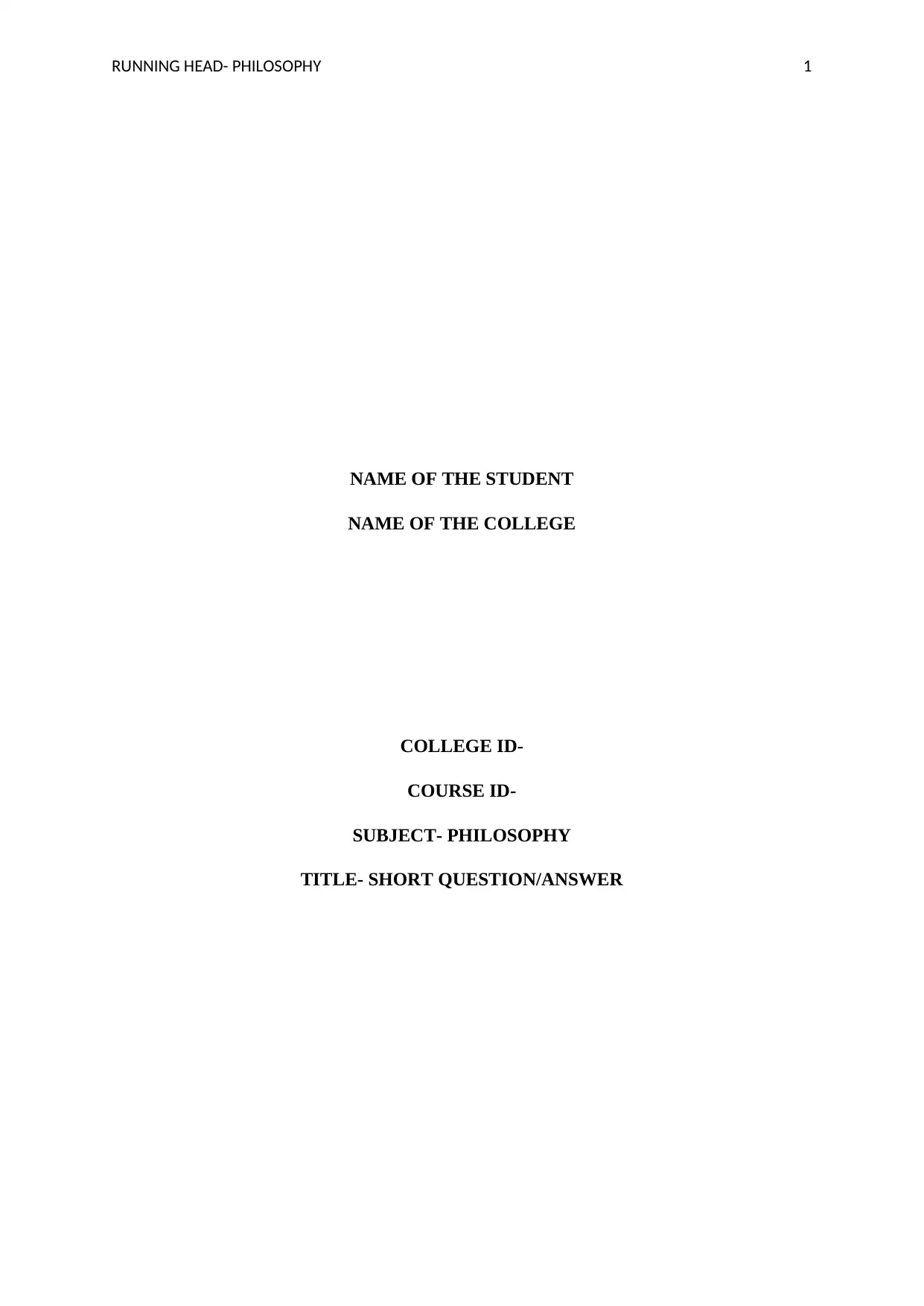
RUNNING HEAD- PHILOSOPHY 1
NAME OF THE STUDENT
NAME OF THE COLLEGE
COLLEGE ID-
COURSE ID-
SUBJECT- PHILOSOPHY
TITLE- SHORT QUESTION/ANSWER
NAME OF THE STUDENT
NAME OF THE COLLEGE
COLLEGE ID-
COURSE ID-
SUBJECT- PHILOSOPHY
TITLE- SHORT QUESTION/ANSWER
Paraphrase This Document
Need a fresh take? Get an instant paraphrase of this document with our AI Paraphraser
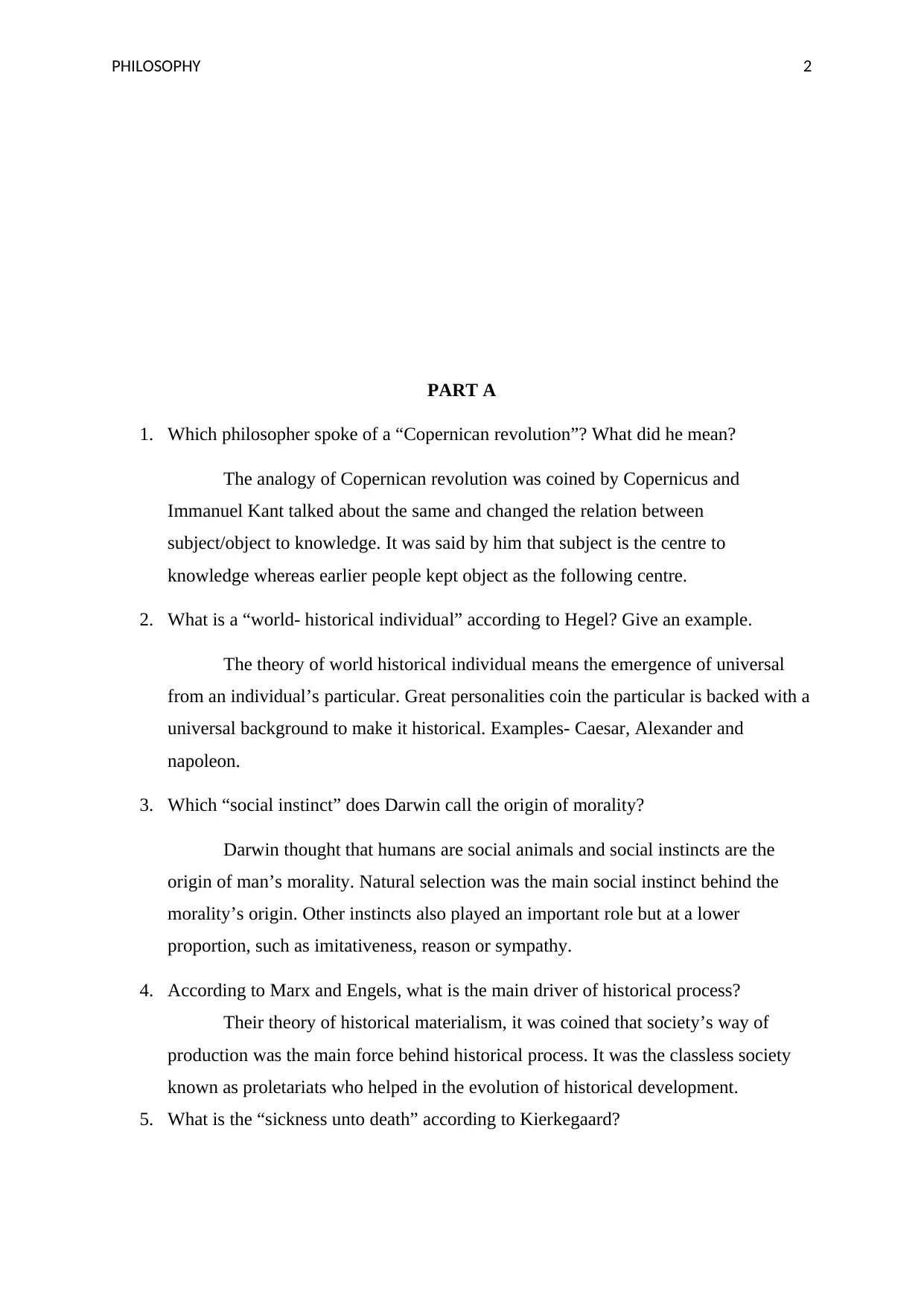
PHILOSOPHY 2
PART A
1. Which philosopher spoke of a “Copernican revolution”? What did he mean?
The analogy of Copernican revolution was coined by Copernicus and
Immanuel Kant talked about the same and changed the relation between
subject/object to knowledge. It was said by him that subject is the centre to
knowledge whereas earlier people kept object as the following centre.
2. What is a “world- historical individual” according to Hegel? Give an example.
The theory of world historical individual means the emergence of universal
from an individual’s particular. Great personalities coin the particular is backed with a
universal background to make it historical. Examples- Caesar, Alexander and
napoleon.
3. Which “social instinct” does Darwin call the origin of morality?
Darwin thought that humans are social animals and social instincts are the
origin of man’s morality. Natural selection was the main social instinct behind the
morality’s origin. Other instincts also played an important role but at a lower
proportion, such as imitativeness, reason or sympathy.
4. According to Marx and Engels, what is the main driver of historical process?
Their theory of historical materialism, it was coined that society’s way of
production was the main force behind historical process. It was the classless society
known as proletariats who helped in the evolution of historical development.
5. What is the “sickness unto death” according to Kierkegaard?
PART A
1. Which philosopher spoke of a “Copernican revolution”? What did he mean?
The analogy of Copernican revolution was coined by Copernicus and
Immanuel Kant talked about the same and changed the relation between
subject/object to knowledge. It was said by him that subject is the centre to
knowledge whereas earlier people kept object as the following centre.
2. What is a “world- historical individual” according to Hegel? Give an example.
The theory of world historical individual means the emergence of universal
from an individual’s particular. Great personalities coin the particular is backed with a
universal background to make it historical. Examples- Caesar, Alexander and
napoleon.
3. Which “social instinct” does Darwin call the origin of morality?
Darwin thought that humans are social animals and social instincts are the
origin of man’s morality. Natural selection was the main social instinct behind the
morality’s origin. Other instincts also played an important role but at a lower
proportion, such as imitativeness, reason or sympathy.
4. According to Marx and Engels, what is the main driver of historical process?
Their theory of historical materialism, it was coined that society’s way of
production was the main force behind historical process. It was the classless society
known as proletariats who helped in the evolution of historical development.
5. What is the “sickness unto death” according to Kierkegaard?
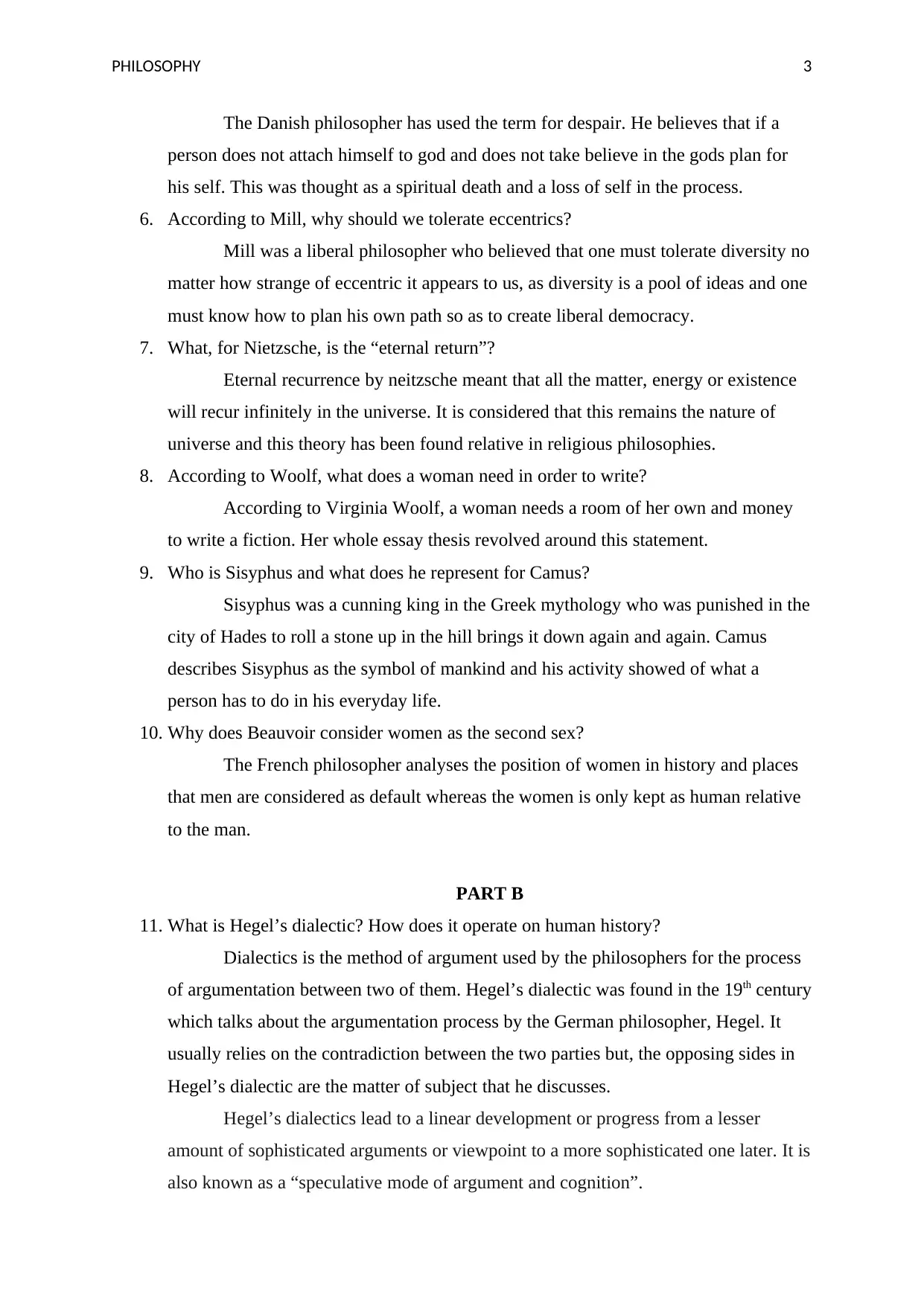
PHILOSOPHY 3
The Danish philosopher has used the term for despair. He believes that if a
person does not attach himself to god and does not take believe in the gods plan for
his self. This was thought as a spiritual death and a loss of self in the process.
6. According to Mill, why should we tolerate eccentrics?
Mill was a liberal philosopher who believed that one must tolerate diversity no
matter how strange of eccentric it appears to us, as diversity is a pool of ideas and one
must know how to plan his own path so as to create liberal democracy.
7. What, for Nietzsche, is the “eternal return”?
Eternal recurrence by neitzsche meant that all the matter, energy or existence
will recur infinitely in the universe. It is considered that this remains the nature of
universe and this theory has been found relative in religious philosophies.
8. According to Woolf, what does a woman need in order to write?
According to Virginia Woolf, a woman needs a room of her own and money
to write a fiction. Her whole essay thesis revolved around this statement.
9. Who is Sisyphus and what does he represent for Camus?
Sisyphus was a cunning king in the Greek mythology who was punished in the
city of Hades to roll a stone up in the hill brings it down again and again. Camus
describes Sisyphus as the symbol of mankind and his activity showed of what a
person has to do in his everyday life.
10. Why does Beauvoir consider women as the second sex?
The French philosopher analyses the position of women in history and places
that men are considered as default whereas the women is only kept as human relative
to the man.
PART B
11. What is Hegel’s dialectic? How does it operate on human history?
Dialectics is the method of argument used by the philosophers for the process
of argumentation between two of them. Hegel’s dialectic was found in the 19th century
which talks about the argumentation process by the German philosopher, Hegel. It
usually relies on the contradiction between the two parties but, the opposing sides in
Hegel’s dialectic are the matter of subject that he discusses.
Hegel’s dialectics lead to a linear development or progress from a lesser
amount of sophisticated arguments or viewpoint to a more sophisticated one later. It is
also known as a “speculative mode of argument and cognition”.
The Danish philosopher has used the term for despair. He believes that if a
person does not attach himself to god and does not take believe in the gods plan for
his self. This was thought as a spiritual death and a loss of self in the process.
6. According to Mill, why should we tolerate eccentrics?
Mill was a liberal philosopher who believed that one must tolerate diversity no
matter how strange of eccentric it appears to us, as diversity is a pool of ideas and one
must know how to plan his own path so as to create liberal democracy.
7. What, for Nietzsche, is the “eternal return”?
Eternal recurrence by neitzsche meant that all the matter, energy or existence
will recur infinitely in the universe. It is considered that this remains the nature of
universe and this theory has been found relative in religious philosophies.
8. According to Woolf, what does a woman need in order to write?
According to Virginia Woolf, a woman needs a room of her own and money
to write a fiction. Her whole essay thesis revolved around this statement.
9. Who is Sisyphus and what does he represent for Camus?
Sisyphus was a cunning king in the Greek mythology who was punished in the
city of Hades to roll a stone up in the hill brings it down again and again. Camus
describes Sisyphus as the symbol of mankind and his activity showed of what a
person has to do in his everyday life.
10. Why does Beauvoir consider women as the second sex?
The French philosopher analyses the position of women in history and places
that men are considered as default whereas the women is only kept as human relative
to the man.
PART B
11. What is Hegel’s dialectic? How does it operate on human history?
Dialectics is the method of argument used by the philosophers for the process
of argumentation between two of them. Hegel’s dialectic was found in the 19th century
which talks about the argumentation process by the German philosopher, Hegel. It
usually relies on the contradiction between the two parties but, the opposing sides in
Hegel’s dialectic are the matter of subject that he discusses.
Hegel’s dialectics lead to a linear development or progress from a lesser
amount of sophisticated arguments or viewpoint to a more sophisticated one later. It is
also known as a “speculative mode of argument and cognition”.
⊘ This is a preview!⊘
Do you want full access?
Subscribe today to unlock all pages.

Trusted by 1+ million students worldwide
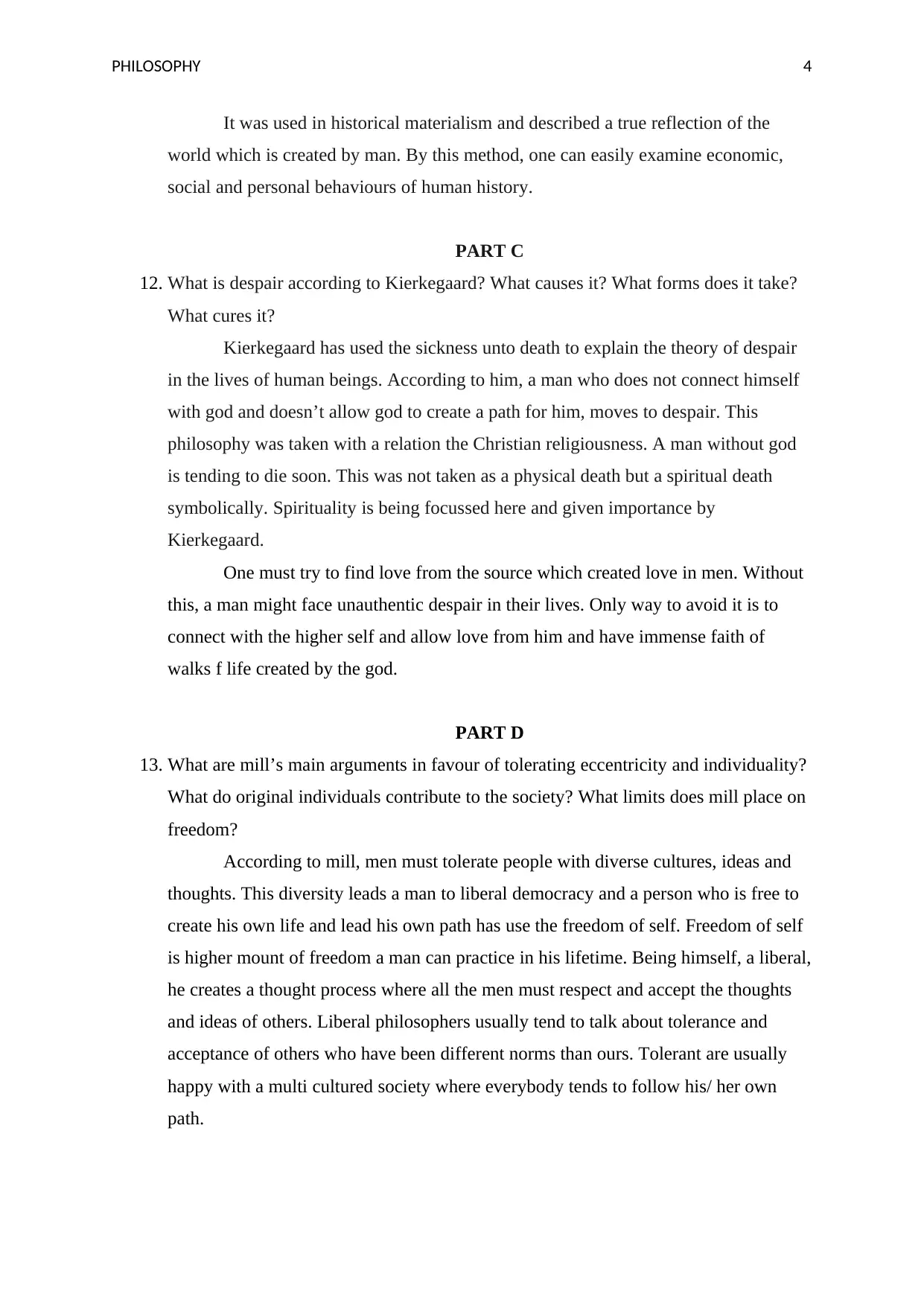
PHILOSOPHY 4
It was used in historical materialism and described a true reflection of the
world which is created by man. By this method, one can easily examine economic,
social and personal behaviours of human history.
PART C
12. What is despair according to Kierkegaard? What causes it? What forms does it take?
What cures it?
Kierkegaard has used the sickness unto death to explain the theory of despair
in the lives of human beings. According to him, a man who does not connect himself
with god and doesn’t allow god to create a path for him, moves to despair. This
philosophy was taken with a relation the Christian religiousness. A man without god
is tending to die soon. This was not taken as a physical death but a spiritual death
symbolically. Spirituality is being focussed here and given importance by
Kierkegaard.
One must try to find love from the source which created love in men. Without
this, a man might face unauthentic despair in their lives. Only way to avoid it is to
connect with the higher self and allow love from him and have immense faith of
walks f life created by the god.
PART D
13. What are mill’s main arguments in favour of tolerating eccentricity and individuality?
What do original individuals contribute to the society? What limits does mill place on
freedom?
According to mill, men must tolerate people with diverse cultures, ideas and
thoughts. This diversity leads a man to liberal democracy and a person who is free to
create his own life and lead his own path has use the freedom of self. Freedom of self
is higher mount of freedom a man can practice in his lifetime. Being himself, a liberal,
he creates a thought process where all the men must respect and accept the thoughts
and ideas of others. Liberal philosophers usually tend to talk about tolerance and
acceptance of others who have been different norms than ours. Tolerant are usually
happy with a multi cultured society where everybody tends to follow his/ her own
path.
It was used in historical materialism and described a true reflection of the
world which is created by man. By this method, one can easily examine economic,
social and personal behaviours of human history.
PART C
12. What is despair according to Kierkegaard? What causes it? What forms does it take?
What cures it?
Kierkegaard has used the sickness unto death to explain the theory of despair
in the lives of human beings. According to him, a man who does not connect himself
with god and doesn’t allow god to create a path for him, moves to despair. This
philosophy was taken with a relation the Christian religiousness. A man without god
is tending to die soon. This was not taken as a physical death but a spiritual death
symbolically. Spirituality is being focussed here and given importance by
Kierkegaard.
One must try to find love from the source which created love in men. Without
this, a man might face unauthentic despair in their lives. Only way to avoid it is to
connect with the higher self and allow love from him and have immense faith of
walks f life created by the god.
PART D
13. What are mill’s main arguments in favour of tolerating eccentricity and individuality?
What do original individuals contribute to the society? What limits does mill place on
freedom?
According to mill, men must tolerate people with diverse cultures, ideas and
thoughts. This diversity leads a man to liberal democracy and a person who is free to
create his own life and lead his own path has use the freedom of self. Freedom of self
is higher mount of freedom a man can practice in his lifetime. Being himself, a liberal,
he creates a thought process where all the men must respect and accept the thoughts
and ideas of others. Liberal philosophers usually tend to talk about tolerance and
acceptance of others who have been different norms than ours. Tolerant are usually
happy with a multi cultured society where everybody tends to follow his/ her own
path.
Paraphrase This Document
Need a fresh take? Get an instant paraphrase of this document with our AI Paraphraser
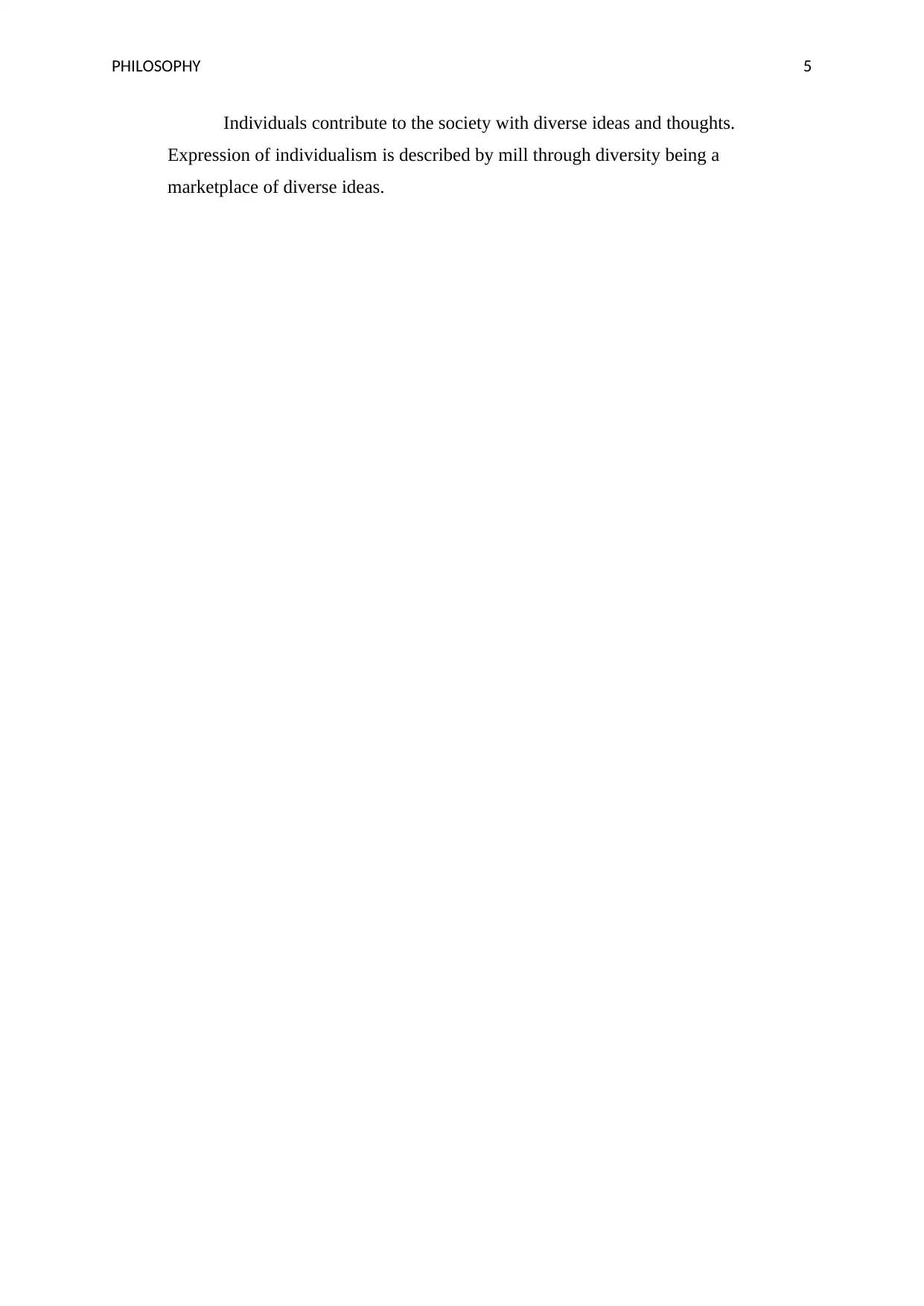
PHILOSOPHY 5
Individuals contribute to the society with diverse ideas and thoughts.
Expression of individualism is described by mill through diversity being a
marketplace of diverse ideas.
Individuals contribute to the society with diverse ideas and thoughts.
Expression of individualism is described by mill through diversity being a
marketplace of diverse ideas.
1 out of 5
Your All-in-One AI-Powered Toolkit for Academic Success.
+13062052269
info@desklib.com
Available 24*7 on WhatsApp / Email
![[object Object]](/_next/static/media/star-bottom.7253800d.svg)
Unlock your academic potential
Copyright © 2020–2026 A2Z Services. All Rights Reserved. Developed and managed by ZUCOL.